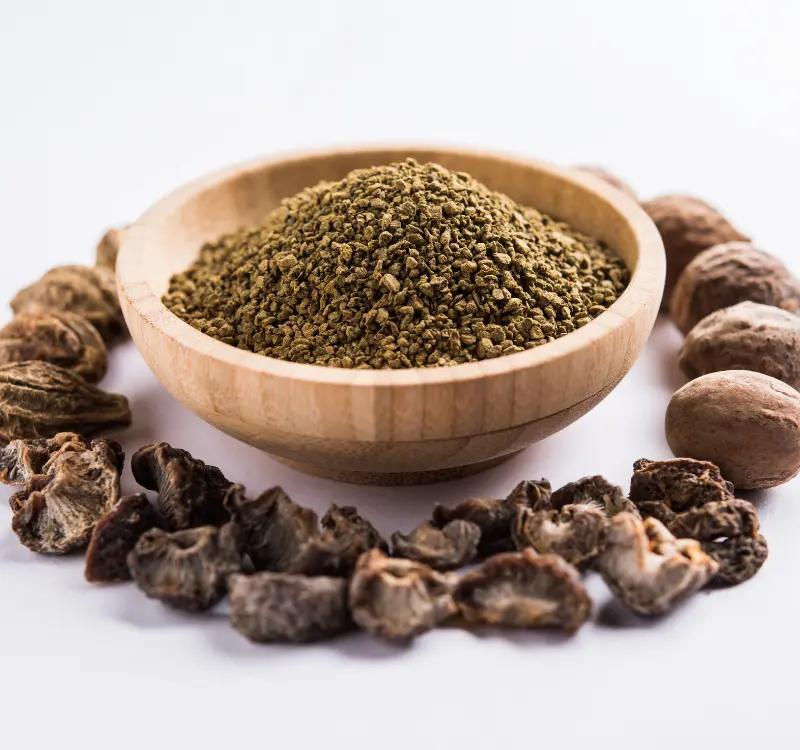Triphala Benefits: Uses, Risks and Side-effects
Jun 13, 2024

Triphala is a traditional herbal mixture used in Ayurvedic medicine. It is made using Amalaki, Bibhitaki, and Haritaki and is known for offering several health benefits.
Table of Contents:
- Triphala Uses in Ayurveda
- Top 10 Benefits of Triphala (As Per Ayurveda)
- How to Use Triphala?
- Triphala Side Effects
- Is there any Potential Risk of Using Triphala?
- Conclusion
- FAQs
The composition of the three natural ingredients make it a powerful natural medicine that is used in the treatment of various body issues relating with digestion, dental problems, heart problems and weight-related issues. In this article, we will explore various uses of triphala, its importance in Ayurveda, and the potential side effects.
Triphala Uses in Ayurveda
According to Ayurveda, Triphala is highly regarded for its ability to nourish and revive the body, while also cleansing toxins. It is particularly beneficial for balancing the three doshas namely Vata, Pitta, and Kapha. Vata controls movement and function while Pitta keeps a check on digestion and metabolism. Kapha is responsible for overall strength and stability of the body. Hence, triphala is considered as a useful Ayurvedic medicine that helps to stabilise the function of the body.
Top 10 Benefits of Triphala (As Per Ayurveda)
1. Triphala for Digestive Health or Pachana
Triphala is great for digestion and helps your body take in nutrients better. It is made from three fruits that work together to help your stomach break down food more easily. Triphala keeps stomach acid balanced, helping to prevent heartburn. Since it improves digestion, you can also use triphala for constipation.
2. Detoxification or Shodhana
Another significant benefit of Triphala is its powerful detoxifying properties. It acts as a gentle cleanser for the intestines, helping to clear out toxins by promoting regular bowel movements. The detoxification process also supports the purification of blood and enhances liver function, which is crucial for filtering impurities from the body.
3. Eye Health or Chakshushya
Triphala is renowned for its benefits to eye health, often referred to as Chakshushya in Ayurveda. It nourishes and strengthens the eye muscles, significantly improving vision clarity. The antioxidants in Triphala, particularly from Amalaki, help defend against oxidative stress that can damage eye tissues. Regular consumption may also help prevent issues like glaucoma and cataracts by maintaining healthy blood vessels in the eyes.
4. Triphala for Immunity or Ojas Building
Triphala is considered a potent Ojas building tonic in Ayurveda, which means a substance that enhances vitality and strengthens the immune system. It works by rejuvenating body tissues and promoting the removal of toxins, which can enhance immune response and fight against infections. The bioactive compounds in Triphala stimulate immune cells and have anti-inflammatory properties.
5. Triphala for Weight Loss or Medohara
If you are considering weight loss, then Triphala is great for weight loss because it helps manage fat and boosts metabolism, especially when taken on an empty stomach. It improves digestion and has detoxifying properties that help clear out toxins which might lead to weight gain. Triphala also has a gentle laxative effect that prevents constipation, making digestion more efficient and aiding in weight control.
6. Skin Health or Tvacha
You can experience numerous triphala benefits for skind ue to its anti-inflammatory and antioxidant properties. These properties help in enhancing skin texture and combating signs of ageing such as wrinkles and fine lines. Regular use of Triphala can contribute to healthier, more radiant skin by promoting detoxification and rejuvenation, which are vital for maintaining skin elasticity and glow.
7. Joint Health or Sandhivata Harana
Triphala is beneficial in supporting joint health due to its anti-inflammatory effects. It helps reduce joint stiffness and pain, which are common symptoms of arthritis and other joint-related issues. By aiding in the removal of toxins from the joints and nourishing the tissues, Triphala can improve joint mobility and comfort, offering a natural approach to pain relief and joint care.
8. Respiratory Health or Pranavaha Srotas Shuddhi
Triphala helps maintain a healthy respiratory tract by assisting in the clearance of excess mucus and promoting the purification of the airways. This action is particularly beneficial for those with congested respiratory systems or who suffer from chronic respiratory conditions like asthma.
9. Cardiovascular Health or Hridya
One of the triphala health benefits includes managing blood pressure and cholesterol levels. This makes it useful for keeping the heart working well and preventing heart-related issues. By helping to cleanse the blood and strengthen the heart muscle, Triphala supports overall cardiovascular health.
10. Mental Health or Manasika Swasthya
Triphala can improve mental health by helping to balance the chemicals in the brain that affect mood and thought processes. Its natural properties can soothe the nervous system, promoting relaxation and improving sleep, which are important for maintaining good mental health.
How to Use Triphala?
To get the most from Triphala, it is important to follow the right dosage and timing. Here is all about triphala and how to take it for maximum benefits:
- The recommended triphala dosage is about 500 milligrams to 1 gram per day.
- It is recommended to take triphala on empty stomach. Therefore, the best time to take triphala is right after you wake up in the morning.
- Also, you can take triphala daily.
Triphala Side Effects
Triphala is generally considered safe for most people, but it can have some side effects. These include digestive upset, such as diarrhoea or gas, especially if taken in large amounts. It is important to start with a small dose to see how your body reacts and always follow the recommended dosage. If you experience any severe side effects or allergic reactions, it is best to stop taking Triphala and consult a healthcare provider.
Is there any Potential Risk of Using Triphala?
While Triphala is often safe for many people, there are some potential risks other than the side effects in certain cases such as:
- Pregnant women should avoid Triphala.
- Breastfeeding mothers should also be cautious.
- People taking medications, especially those for diabetes or blood thinners, need to consult their doctor because Triphala can interact with these drugs.
- Individuals with digestive disorders such as IBS or ulcerative colitis may find that Triphala worsen their symptoms.
- Those scheduled for surgery should stop taking Triphala beforehand to avoid potential complications with blood sugar and bleeding.
Moreover, it is best to use triphala under the guidance of an Ayurveda practitioner or a general physician in case you are undergoing a treatment.
Conclusion
In conclusion, Triphala is a highly esteemed Ayurvedic remedy known for its wide-ranging health benefits, from improving digestion and boosting immunity to supporting skin and cardiovascular health. However, like any supplement, it is essential to use Triphala wisely. Start with a small dose, observe how your body responds, and consult a healthcare professional if you are pregnant, breastfeeding, have a chronic condition, or are taking other medications. By following these guidelines, you can safely integrate Triphala into your wellness routine and enjoy its numerous health-promoting properties.
Frequently Asked Questions
Yes, Triphala can be taken daily as it helps in digestion, detoxification, and improving overall health. It is advisable to follow the recommended dosage and consult with a healthcare provider if you have any underlying health conditions.
Triphala is generally safe but can cause digestive upset such as diarrhoea or gas if taken in excessive amounts. It is important to start with a low dose to assess tolerance.
Triphala may help in weight management, including reducing belly fat, by enhancing digestion and metabolism and having a mild laxative effect.
Triphala can support kidney health by promoting detoxification and preventing the buildup of toxins, though direct evidence specific to kidney health improvement is limited.
The general dosage of Triphala powder is about half or one teaspoon, which can be taken once or twice a day, usually on an empty stomach.
Pregnant women, breastfeeding mothers, and people taking certain medications such as blood thinners or diabetes medication should consult a doctor before taking Triphala.
Triphala can cause gas or bloating, particularly when starting use or if taken in higher than recommended doses.
Triphala supports liver function by aiding detoxification and cleansing the blood. However, those with liver conditions should consult with a healthcare provider before use.















